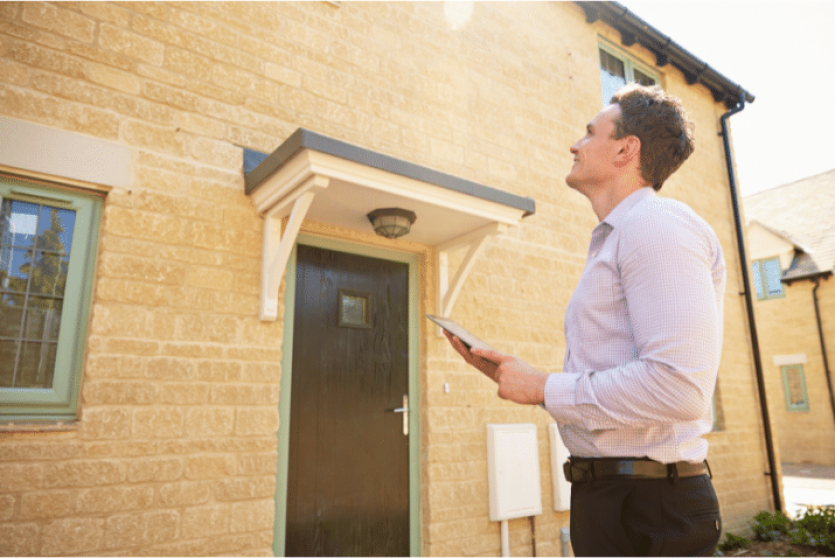- Home
- News and What's Going On At Leaders
- Property valuation: What is looked at when valuing a home?
Property valuation: What is looked at when valuing a home?

A basic valuation of a home can be done online, however the only real way to know what a property is worth is to have someone from your local estate agents visit in person.
If you’re thinking about selling your home, here are the 5 key things a valuer will take into consideration to arrive at their property valuation:
Location and plot size
Firstly, they look at the location of the property. Professional valuers will be aware which roads and/or postcodes are worth more than other neighbouring areas – that’s why it’s best to use someone who works locally. Factors such as being near amenities, easy access to transport links, road noise and environmental factors such as the risk of flooding will all influence the value, up or down.
Land can vary in price, but valuers will often have an idea of what it will be worth per square foot – or metre – in your location. Typically, the bigger the plot, the more a property will be worth, especially if it means there’s the potential for development, such as extending the property or even building another house on the land.

Property type
A property’s value will typically be affected by supply and demand for that particular type of home. Some properties are inevitably worth more than others – for example, in some areas a Victorian property may command a premium versus a new build, whereas in other areas it might be the opposite. Listed and more unique buildings tend to be sold at a premium, especially if they are in popular locations with a decent plot size.
Number of rooms, floor size and parking space
In some countries, like America, properties are often strictly priced by space. Here in the UK, while we do consider the overall floor area in a property valuation, pricing tends to be more driven by the number of bedrooms and other rooms in the property. That means it’s possible for a 5-bed home to be valued at more than a 3-bed home, even if the 3-bed has more floor space.
The balance of inside and outside space also comes into play. For example, a 5-bed home with a tiny garden is unlikely to suit a family, which might restrict the number of people prepared to make an offer. In this case, it might be necessary to price the property lower than other homes that have larger plots, even if they have fewer bedrooms. Or perhaps a home might have a big garden and lots of rooms downstairs, but only two bedrooms – again, this lack of balance is likely to restrict the number of interested buyers and therefore lower the value of the property, even if it has a good amount of overall space.
Parking can also play its part in a property’s valuation, particularly in areas where parking is a premium, such as London and other inner-city neighbourhoods. While private parking can add value, a lack of off-road parking can negatively impact the price.
Understanding how much a property is worth from a space, room and parking perspective in a specific area is perhaps more subjective than scientific, but it’s the valuer’s job to understand the differences and price accordingly.

Recent comparable sales
To help understand and confirm the impact of location, plot size and the number of rooms on a property’s value, an expert will look for similar properties nearby that were sold recently – ideally within the last three months. The property market can easily move up or down within a three-month period, so the more recent the comparable property sale, the more accurate the price is likely to be today. A valuer may also take into account properties currently under offer, especially if there aren’t many sold comparables, and find out whether the accepted offer was below, at or above the asking price.
Property condition
If you have two identical properties, it’s the condition of each that might make a difference in price. Things like damp or a badly maintained roof will result in a lower valuation, with the valuer typically deducting the cost of the work required from the price offered.
If improvement works (e.g. extensions or conversions) have been carried out, relevant paperwork should prove all the necessary permissions and certificates were obtained, such as notices for extensions, planning permission and building regulations approval. This is particularly true for listed properties, which often need additional approval. Essentially, the more paperwork a seller can provide to show that works were carried out properly and the property is safe to live in, the better the valuation is likely to be.
Finally, valuers will take into account any restrictions or lease elements that affect the use of a property. That’s things like rights of way across the land, shared driveways and ‘flying freeholds’. Leasehold flats can be more complex to value, due to the additional consideration of shared spaces, ground rents, service charges and lease lengths. If a lease has fewer than 80 years remaining, that can restrict borrowing, and some leases have ‘escalating’ ground rent charges that are predicted to cost a small fortune in years to come – both these factors can have a significant impact on the valuation.
If you’re looking to sell your property, you can request a free, no obligations property valuation from us.
Looking for advice?
If you're looking to let or sell your property, we can help. Get in touch with your local branch or book in for a property valuation.

Contact Us
Got a question, general enquiry or something else?
You may also like
Since we started in 1983 we have grown to one of the UK’s largest property groups, we can save you time and money by offering a range of services and expertise under one roof.



